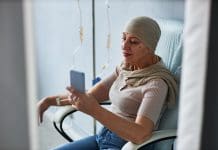A new treatment approach for aggressive breast cancers significantly improves survival rates for patients
In a new trial by the University of Cambridge, researchers found that aggressive breast cancers were treated with chemotherapy followed by a targeted cancer drug before surgery; 100% of patients survived the critical three-year period post-surgery.
This discovery could become the most effective treatment to date for patients with early-stage breast cancer with inherited BRCA1 and BRCA2 gene mutations.
“It is rare to have a 100% survival rate in a study like this and for these aggressive types of cancer”, commented Jean Abraham.
Providing new hope for patients with aggressive breast cancers
Current standard treatment for aggressive breast cancers aims to shrink the tumour using chemotherapy and immunotherapy before removing it through surgery. The first three years after surgery are a critical period when there is the most significant risk of relapse or death.
The Partner trial saw patients recruited from 23 NHS sites across the UK. It took a different approach, demonstrating two innovations: the addition of olaparib and chemotherapy pre-surgery and the benefits of careful timing when the treatments are given to patients. Taken as tablets, olaparib is a targeted cancer drug already available on the NHS.
100% of patients survived
The results show that leaving 48 hours between chemotherapy and olaparib leads to better outcomes, possibly because a patient’s bone marrow has time to recover from chemotherapy while leaving the tumour cells susceptible to the targeted drug.
Of the 39 aggressive breast cancer patients who received the two treatments, only one patient relapsed three years after surgery, and 100% of patients survived.
In comparison, the survival rate for the control arm was 88% three years after surgery. Of the 45 patients on the control arm who received chemotherapy only, nine patients relapsed, of whom six died.
The treatment combination could have cost-saving benefits for the NHS, as patients currently offered olaparib take the drug post-surgery for 12 months. In contrast, patients in the trial took the tablets pre-surgery for 12 weeks.
Addenbrooke’s consultant and trial lead, Professor Jean Abraham, said: “It is rare to have a 100% survival rate in a study like this and for these aggressive types of cancer. We’re incredibly excited about the potential of this new approach, as we must find a way to treat and hopefully cure patients diagnosed with BRCA1 and BRCA2 related cancers.”
Chief Executive of Cancer Research UK, Michelle Mitchell, said: “One of the best ways that we can beat cancer sooner is by making more effective use of treatments already available.
“While this research is still in its infancy, it is an exciting discovery that adding olaparib at a carefully timed stage of treatment can potentially give patients with this specific type of breast cancer more time with their loved ones.
“Research like this can help find safer and kinder ways to treat certain types of cancer. Further studies in more patients are needed to confirm whether this new technique is safe and effective enough to be used by the NHS.”
Professor Abraham and team are now planning the next phase of the research, which will look to replicate the results in a larger study and confirm that the Partner approach offers a less toxic treatment for patients and is more cost effective than the current standard of care.











